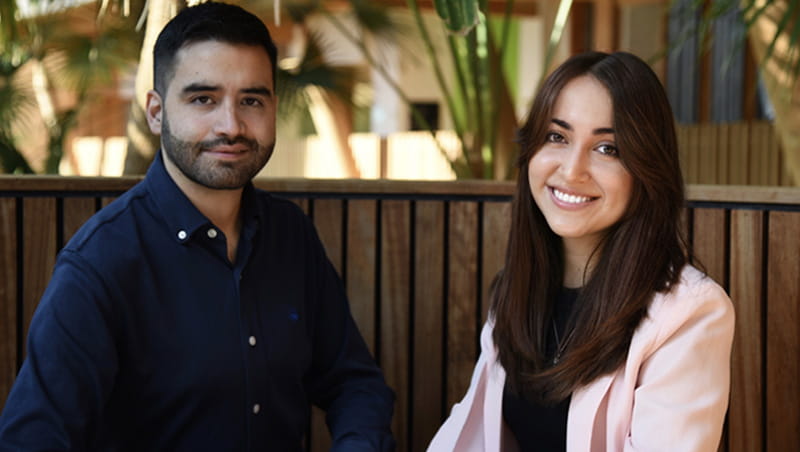A former Essex linguistics student has been given the opportunity to develop her EdTech English language business further after a successful application to the UK Government’s new Innovator Founder visa scheme.
Cami and her husband Seba, both from Chile, launched ‘Learn to Learn’ after receiving a two-year Essex Startup visa in 2021. The pair were thrilled to receive the news that they’d been granted the visa in August 2023 after a lot of hard work and a long wait. “This gives us the green light to continue working on our business here in the UK for another three years,” said Cami.
Cami came to the University of Essex in 2019, to study a master’s degree in applied linguistics, following six years teaching English as a foreign language in Chile. Her intention was to enhance her English skills, broaden her international network and gain experience in an English-speaking country. “I had no plan to launch a business when I first came to Essex and at that time, I had no knowledge of the Essex Startups Team.”

The Startup journey
When the pandemic struck in 2020, Cami was entering the final stages of her masters and looking ahead to what she and her husband might do next. The chances of finding a sponsor for a work visa during lockdown were slim, and with the clock running down on their student visa, the couple began to look at other options. They’d already had an idea for a business and the solution came in the form of a leaflet about Essex Startups.
“After my masters finished, we moved to Liverpool for a few months, and it was there that we began developing our business.” Seba had a background in business, having studied an MBA in Madrid, and Cami had the skills and the creativity to design an innovative method of teaching English. “We didn’t just want to teach English in a traditional way, we wanted to help students with their confidence and self-esteem through our online platform.”
Cami had noticed during her linguistics lectures that though her fellow students had good enough levels of English to complete their assessments, some lacked the confidence to speak up in class.
Seba said “Confidence is key in the communication of ideas, so our programme includes areas of soft skills, self-development and culture alongside language learning.”
Cami’s mantra is “hard skills get you in, soft skills get you far.” Coming from very humble beginnings, she knows just how important it is to offer opportunities to low-income students and provide them with the tools to enhance their life chances.
The visa process
For Cami and Seba, their life chances changed when they submitted their business plan to the Essex Startups team and were successful in receiving a two-year visa to launch ‘Learn to Learn’. The UK Government has now discontinued the Start Up visa and has replaced it with the new Innovator Founder visa.
The couple’s application for the Innovator visa was tough, having to fulfil three criteria: proving that the business is 1. viable, 2. innovative, and 3. scalable. With the endorsement of an organisation called International Innovators, they finally received news that they had been successful.
Cami said, “It was a long wait, but we are now able to sign agreements with companies and academic institutions to offer our services to their employees, students, and families at a discounted price. It is a lot of work, but we are committed to the steady growth of our business.”
There is no limit to the number of times the Innovator Founder visa can be extended and after three years in the UK, Cami and Seba will also have the chance to apply to settle in the UK.
If you would like more information about the types of visa available following your studies, you can find out more on our Working in the UK pages.




